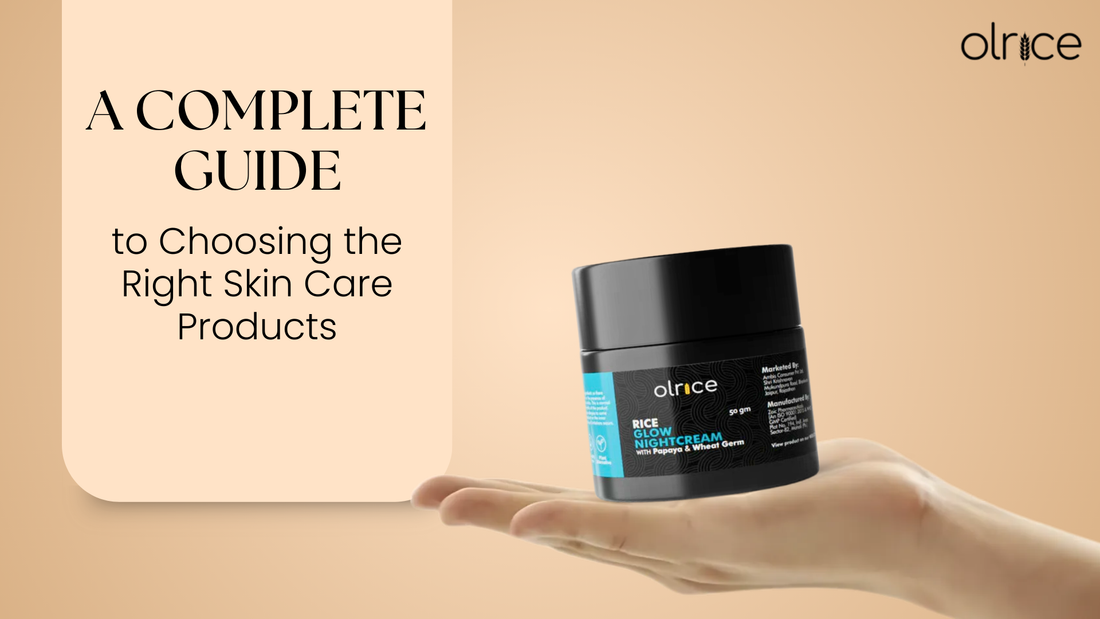
The Ultimate Guide to Choosing the Best Skin Care Products
Share
With an overwhelming number of skincare products available, finding the right ones can be a daunting task. From cleansers to serums and moisturizers, each product serves a distinct purpose. But how do you determine which products will best suit your skin type and concerns?
Everyone’s skin is unique, influenced by factors such as genetics, ethnicity, and environment. This makes it essential to choose products that align with your specific needs. In this guide, we’ll take you through a step-by-step approach to selecting skincare products that genuinely work. Whether you’re a beginner or a skincare enthusiast, this guide will help you make informed choices.
Step 1: Identify Your Skin Type
The foundation of a great skincare routine is understanding your skin type. Different skin types require different products:
- Oily Skin: Opt for lightweight, gel-based, oil-free formulas labeled "non-comedogenic" to prevent clogged pores.
- Dry Skin: Choose hydrating ingredients like hyaluronic acid, ceramides, and glycerin to maintain moisture.
- Combination Skin: Balance hydration by using lightweight products that won’t overburden oily areas.
- Sensitive Skin: Select fragrance-free, soothing products with ingredients like aloe vera and chamomile.
- Normal Skin: Maintain your natural balance with gentle, hydrating products.
Step 2: Address Your Skin Concerns
Once you know your skin type, determine your primary concerns. Are you struggling with acne, fine lines, dullness, or uneven texture? Each issue requires specific ingredients:
- Acne-Prone Skin: Look for salicylic acid, tea tree oil, and benzoyl peroxide.
- Aging Skin: Retinol, peptides, and antioxidants like Vitamin C help reduce wrinkles and fine lines.
- Hyperpigmentation: Ingredients like niacinamide and Vitamin C brighten dark spots and even skin tone.
- Dull Skin: AHAs (alpha-hydroxy acids) and BHAs (beta-hydroxy acids) help exfoliate and revitalize skin.
Step 3: Learn About Essential Ingredients
Understanding skincare ingredients helps you make informed decisions. Here are some key ingredients and their benefits:
- Hyaluronic Acid: Locks in moisture for hydrated, plump skin.
- Niacinamide: Reduces redness, regulates oil production, and minimizes pores.
- Vitamin C: Protects against free radicals and brightens the skin.
- Retinol: Boosts collagen production and smooths wrinkles.
- Ceramides: Strengthen the skin barrier and improve hydration.
- SPF: Protects against UV rays and prevents premature aging.
Step 4: Establish a Simple Routine
Start with a straightforward routine before incorporating advanced treatments. A basic routine includes:
- Cleanser: Removes dirt, oil, and makeup without stripping natural oils.
- Toner: Balances pH levels and preps the skin for treatment products.
- Serum: Targets specific concerns such as acne, dark spots, or wrinkles.
- Moisturizer: Hydrates and locks in moisture for smooth, supple skin.
- Sunscreen (AM Only): Shields skin from harmful UV rays and environmental damage.
Pro Tip: Avoid excessive layering of products to prevent irritation. Stick to a minimal yet effective routine.
Step 5: Always Patch Test Before Use
Before fully incorporating a new product into your routine, conduct a patch test. Apply a small amount of the product to your inner forearm or behind your ear and wait 24–48 hours for any signs of irritation or allergies. This step is crucial, especially for those with sensitive or acne-prone skin.
Step 6: Prioritize Quality Over Trends
Not all skincare products are created equal. Choose products from reputable brands that focus on research, dermatological testing, and quality ingredients. Avoid harsh chemicals, parabens, and artificial fragrances that may cause irritation.
Pro Tip: Check reviews and look for clinical studies backing product claims before purchasing.
Step 7: Stay Consistent and Patient
Skincare is a long-term commitment. Results take time, typically 4–6 weeks, to become noticeable. Stick to your routine, avoid frequently switching products, and be patient for the best results.
Common Mistakes to Avoid When Selecting Skin Care Products
- Ignoring Your Skin Type: Choosing unsuitable products can aggravate skin issues.
- Following Trends Blindly: Not every popular product is suitable for your unique skin needs.
- Skipping Sunscreen: Sunscreen is essential, no matter the weather or skin type.
- Overloading with Active Ingredients: Using too many actives at once can lead to sensitivity and irritation.
Conclusion
Choosing the right skincare products requires understanding your skin’s unique needs. Since every individual’s skin differs due to genetic and environmental factors, a personalized approach is essential. By following these steps, you can build an effective skincare routine that keeps your skin radiant and healthy.
Remember, great skin doesn’t happen overnight. Experiment, find what works best for you, and stay consistent. With the right products and patience, you’ll achieve your skincare goals in no time!
Ready to upgrade your skincare routine? Explore high-quality products tailored to your skin's needs today!
